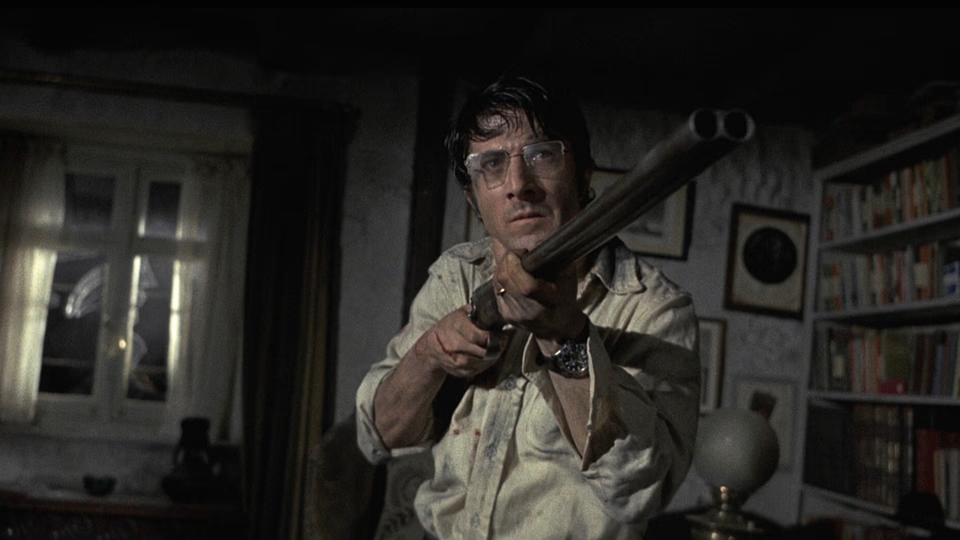Straw Dogs

Sam Peckinpah’s Straw Dogs is an ugly, brutal, nihilistic, gut-punch of a horror film.
Horror fans will recognize the plot. A young couple moves to a small, isolated village where they hope to renovate an old house. They ignore repeated warnings to leave and bad things happen, culminating in the young lovers barricading themselves in their home, fighting to keep an unspeakable evil from gaining entry.
The difference is in the details. Straw Dogs takes place in an English village; the quaint sort you see in romantic comedies. But instead of charming, quirky characters, the residents of this hamlet are leering, hard-drinking thugs.
Into this rural jungle comes mild-mannered American mathematician David (Dustin Hoffman) and his attractive wife Amy (Susan George). They’re fleeing some vague unrest in America and the village is her childhood home.
As we meet David and Amy, we get our first indication the film will stray from the formula. They aren’t the typical idyllic couple thrust into danger. David’s condescending manner alienates the few locals who would befriend him but he’s too self-absorbed to notice. His intellectual snobbery leads him to treat Amy like a child. Amy’s petulant responses only reinforce the behavior. Their bickering rings true.
The plot kicks in when some local men, including a former boyfriend of Amy’s, named Charlie, worm their way into a job repairing the couple’s garage roof. The men drag out the work. They ogle Amy. One sneaks into the house and steals a pair of Amy’s panties, which he later flaunts at the pub. Things reach a tipping point when David and Amy discover their cat hung in their bedroom closet. When David proves reluctant to confront the men, Amy presses the issue. David snaps at her. She calls him a coward.
This conflict between David and Amy sets up the film’s most controversial scene: Charlie raping Amy.
It’s a hard scene to watch. I’ve seen the film multiple times, and it doesn’t get any easier. At first, Amy screams and fights back. Charlie slaps her and she crumbles to the floor in slow motion. Resigned to her fate, Amy stops fighting.
Then Peckinpah twists the knife. He quick cuts between the present and Amy’s intimate memories of David. Amy’s anger toward David swirls and churns inside her. Her resignation turns to passion as she turns from victim to betrayer and embraces her former lover.
Finally, as Amy and Charlie lay entwined, Peckinpah goes for the jugular. One of Charlie’s goon friends enters, holding a shotgun. With some reluctance, Charlie steps aside and watches his friend force himself on Amy at gunpoint. Amy’s shrieks surround us as her violation is absolute.
Controversial? Absolutely. Gratuitous? No. The scene is horrifying but necessary. It drives an unspoken wedge between David and Amy, setting up the rest of the story.
The finale sees Charlie and gang laying siege to David and Amy’s house. It’s a familiar scene in horror films; the men could just as easily be zombies or other monsters, and Peckinpah uses lots of low-angle shots and foggy back lights. But the real horror isn’t what’s trying to get in, it’s what’s coming out between David and Amy.
A series of plot-driven coincidences have led to David sheltering a mentally challenged man in the couple’s attic. The mob outside believes this man murdered a local girl earlier that evening. When the attacks start, Amy urges David to acquiesce to the mob’s demands and turn the man over, but David refuses. Bitter that David will stand up for a stranger but not her, Amy refuses to help. This proves the turning point in their relationship. Later, when Amy’s in trouble, she yells for Charlie.
It’s easy to dismiss Straw Dogs as misogynistic, but that’s short-sighted. This film hates everyone. While Amy is assaulted, David’s out hunting with the very men who attack her. Of course, the trip was just a ruse to lure him away, but David only accepted to buddy-up with alpha-male Charlie. David would label himself a pacifist but behaves as a sycophant.
And that goes to what makes the film special. It’s violent, sure, but it’s not the violence that stays with you. Rather, it’s the bleak reflection of human nature. Horror movies tend to paint their protagonists as bland, cookie-cutter stereotypes; their misfortune born out of some trespass or bad luck. Not here.
The horror of Straw Dogs isn’t that it could happen to us, it’s that the characters could be us. By committing to its bleak vision the film projects authority. By making its protagonists monsters themselves, the film transcends the exploitation genre. It may not be entertaining in the conventional sense, but every viewing stays with me for days. I may not like what Straw Dogs is saying, but I can’t deny its impact.